初一英语四种基本时态
初一英语时态总结
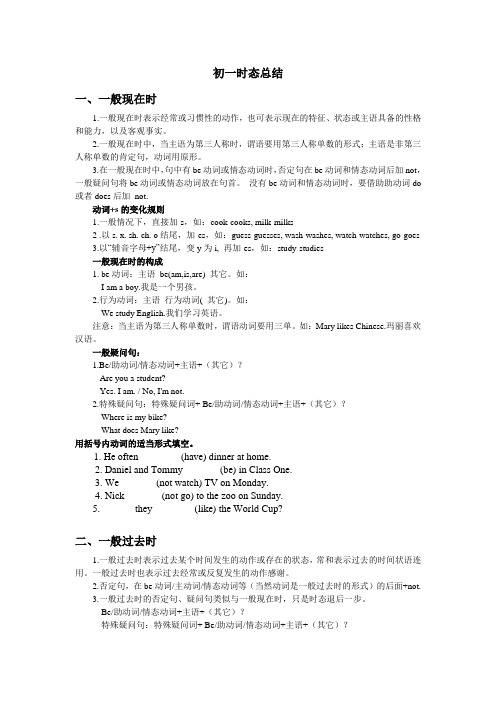
初一时态总结一、一般现在时1.一般现在时表示经常或习惯性的动作,也可表示现在的特征、状态或主语具备的性格和能力,以及客观事实。
2.一般现在时中,当主语为第三人称时,谓语要用第三人称单数的形式;主语是非第三人称单数的肯定句,动词用原形。
3.在一般现在时中,句中有be动词或情态动词时,否定句在be动词和情态动词后加not,一般疑问句将be动词或情态动词放在句首。
没有be动词和情态动词时,要借助助动词do 或者does后加not.动词+s的变化规则1.一般情况下,直接加-s,如:cook-cooks, milk-milks2 .以s. x. sh. ch. o结尾,加-es,如:guess-guesses, wash-washes, watch-watches, go-goes3.以“辅音字母+y”结尾,变y为i, 再加-es,如:study-studies一般现在时的构成1. be动词:主语be(am,is,are) 其它。
如:I am a boy.我是一个男孩。
2.行为动词:主语行为动词( 其它)。
如:We study English.我们学习英语。
注意:当主语为第三人称单数时,谓语动词要用三单。
如:Mary likes Chinese.玛丽喜欢汉语。
一般疑问句:1.Be/助动词/情态动词+主语+(其它)?-Are you a student?-Yes. I am. / No, I'm not.2.特殊疑问句:特殊疑问词+ Be/助动词/情态动词+主语+(其它)?Where is my bike?What does Mary like?用括号内动词的适当形式填空。
1. He often ________(have) dinner at home.2. Daniel and Tommy _______(be) in Class One.3. We _______(not watch) TV on Monday.4. Nick _______(not go) to the zoo on Sunday.5. ______ they ________(like) the World Cup?二、一般过去时1.一般过去时表示过去某个时间发生的动作或存在的状态,常和表示过去的时间状语连用。
初一英语四种时态讲解

初中英语四种时态详细讲解(适合初一学生)1.一般现在时:(1)表示经常发生(2)构成:先瞧主语主语就是三单,动词+s主语非三单,动词用原形。
They often watch TV、He often watchesTV、(3)变化:问句:主语前+do/does,动词用原形;否定:主语后+don't/doesn’t,动词用原形.Do they oftenwatch TV?They don’t often watch TV、Doeshe oftenwatch TV?He doesn’toften watchTV、2.现在进行时:a)表示现在正在发生。
句中常有now,look,listen等b)构成:主语+be+doingShe iswatchingTVnow、c)变化问句:提前be(am,is,are)Isshe watching TV now?否定:be后+notSheisn'twatching TV now、d)加ing得方法:一般直接+,去不发音得e加,闭音节双写+。
3.一般过去时:a)表示过去得动作或状态,句中常有yesterday,last等过去得时间。
b)构成:动作:主语+动词得过去式状态:主语+was/were(句中没实意动词)Shewatched TV last night、She was herelast night、c)变化:问句:主语前+did,动词用原形DidshewatchTV last night?Was she here lastnight?否定:主语后+didn’t,动词用原形.She didn’twatch TV lastnight、She wasn’t watch TV last night、(4)过去式:一般+ed;e结尾+d;辅音+y得,去y+ied;闭音节双写+ed;不规则得120页。
4.一般将来时:a)表示:将来,句中有表示将来得时间:tomorrow、next、soon,intwo days等b)构成A:主语+will+do(任何人称)B:主语+shall+do(仅第一人称I,we)C:主语+be going to +do 如:A:Shewillwatch TV this evening、B:Weshallwatch TV this evening、C:She is going to watch TV this evening、c)变化问句:提前will/shall/beA:Will she watch TV this…?B:ShallwewatchTV …?C:Isshe going towatch…?否定:在will/shall/be 后+notA: She won't watch TV…B:We shall notwatch…shan'tC:She isn’t going to watch…There is a meeting next week、Therewas a meetingyesterday、There will be a meeting next…=Thereisgoing tobeameeting next …。
初中英语时态归纳

初中英语时态归纳
初中英语时态主要包括一般现在时、现在进行时、一般过去时和一般将来时。
1. 一般现在时:表示经常性或习惯性动作,常与表示频度的时间状语连用,如always, usually, often, sometimes, every week (day, year, month…), once a week, on Sundays等。
基本结构是be动词(am/is/are)+动词原形。
否定形式是在be动词后加not,疑问句则把be动词放在句首。
2. 现在进行时:表示现阶段或说话时正在进行的动作及行为,常与now, at present, these days等时间状语连用。
基本结构是be 动词+动词的现在分词。
疑问句则把be动词放在句首。
3. 一般过去时:表示过去某个时间里发生的动作或状态,也表示过去习惯性、经常性的动作、行为。
常与表示过去的时间状语连用,如yesterday, last night, the other day等。
基本结构是be动词的过去式或行为动词的过去式。
4. 一般将来时:表示将来要发生的动作或状态,也表示将来经常或反复发生的动作,常与tomorrow, next year等时间状语连用。
基本结构是be动词的将来式或行为动词的将来式。
此外,还有现在完成时和过去完成时等时态。
如需更多信息,建议查阅英语语法书籍或咨询英语老师。
英语四种时态
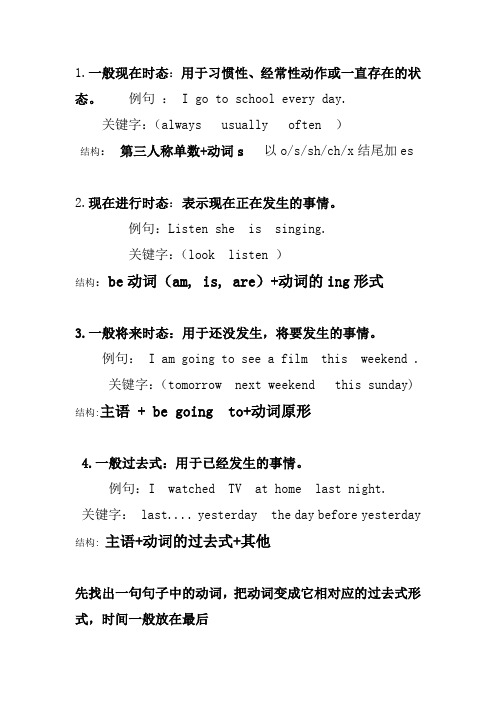
1.一般现在时态:用于习惯性、经常性动作或一直存在的状态。
例句: I go to school every day.
关键字:(always usually often )
结构:第三人称单数+动词s 以o/s/sh/ch/x结尾加es
2.现在进行时态:表示现在正在发生的事情。
例句:Listen she is singing.
关键字:(look listen )
结构:be动词(am, is, are)+动词的ing形式
3.一般将来时态:用于还没发生,将要发生的事情。
例句: I am going to see a film this weekend .
关键字:(tomorrow next weekend this sunday) 结构:主语+ be going to+动词原形
4.一般过去式:用于已经发生的事情。
例句:I watched TV at home last night.
关键字: last.... yesterday the day before yesterday 结构: 主语+动词的过去式+其他
先找出一句句子中的动词,把动词变成它相对应的过去式形式,时间一般放在最后。
初一英语重点语法
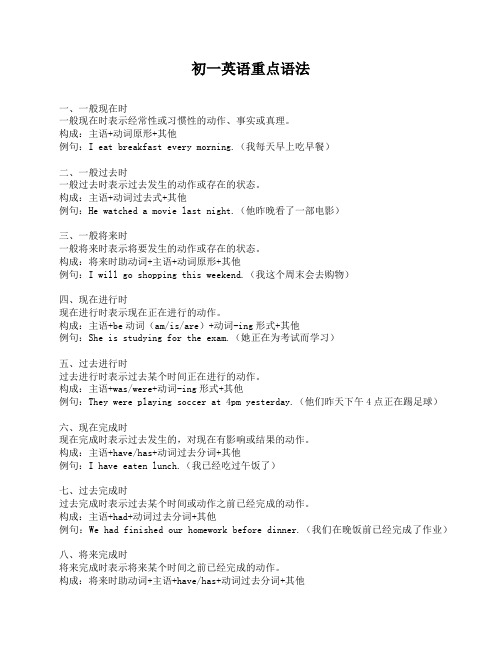
初一英语重点语法一、一般现在时一般现在时表示经常性或习惯性的动作、事实或真理。
构成:主语+动词原形+其他例句:I eat breakfast every morning.(我每天早上吃早餐)二、一般过去时一般过去时表示过去发生的动作或存在的状态。
构成:主语+动词过去式+其他例句:He watched a movie last night.(他昨晚看了一部电影)三、一般将来时一般将来时表示将要发生的动作或存在的状态。
构成:将来时助动词+主语+动词原形+其他例句:I will go shopping this weekend.(我这个周末会去购物)四、现在进行时现在进行时表示现在正在进行的动作。
构成:主语+be动词(am/is/are)+动词-ing形式+其他例句:She is studying for the exam.(她正在为考试而学习)五、过去进行时过去进行时表示过去某个时间正在进行的动作。
构成:主语+was/were+动词-ing形式+其他例句:They were playing soccer at 4pm yesterday.(他们昨天下午4点正在踢足球)六、现在完成时现在完成时表示过去发生的,对现在有影响或结果的动作。
构成:主语+have/has+动词过去分词+其他例句:I have eaten lunch.(我已经吃过午饭了)七、过去完成时过去完成时表示过去某个时间或动作之前已经完成的动作。
构成:主语+had+动词过去分词+其他例句:We had finished our homework before dinner.(我们在晚饭前已经完成了作业)八、将来完成时将来完成时表示将来某个时间之前已经完成的动作。
构成:将来时助动词+主语+have/has+动词过去分词+其他例句:He will have left for Beijing by 8am tomorrow.(他明天早上8点之前会已经出发去北京了)九、一般过去时与过去完成时的区别一般过去时表示过去某个时间发生的动作或存在的状态,而过去完成时表示过去某个时间之前已经完成的动作。
英语四种时态+常见短语
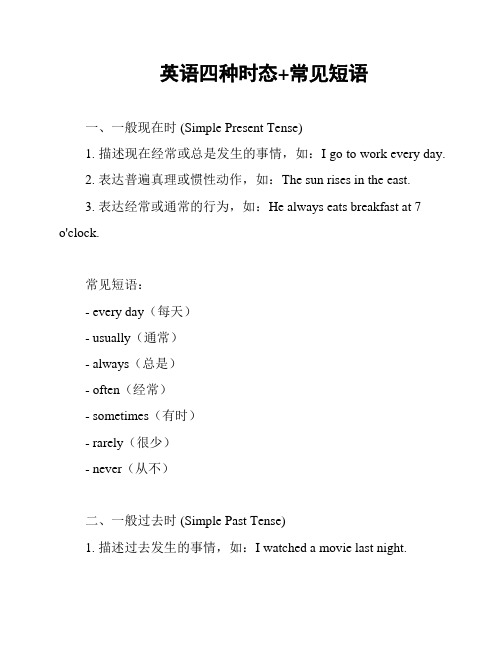
英语四种时态+常见短语一、一般现在时 (Simple Present Tense)1. 描述现在经常或总是发生的事情,如:I go to work every day.2. 表达普遍真理或惯性动作,如:The sun rises in the east.3. 表达经常或通常的行为,如:He always eats breakfast at 7o'clock.常见短语:- every day(每天)- usually(通常)- always(总是)- often(经常)- sometimes(有时)- rarely(很少)- never(从不)二、一般过去时 (Simple Past Tense)1. 描述过去发生的事情,如:I watched a movie last night.2. 表达过去常常发生的动作,如:He often went fishing when he was young.3. 表达过去的惯,如:We lived in that house for many years.常见短语:- yesterday(昨天)- last night(昨晚)- a week ago(一周前)- in the past(在过去)- when I was young(在我年轻的时候)- for many years(多年来)- in those days(在那些日子里)三、一般将来时 (Simple Future Tense)1. 表达将来会发生的事情,如:I will visit my grandparents next week.2. 表示打算或计划做的事情,如:We are going to have a party on Saturday.3. 表达预测的事件,如:I think he will win the game.常见短语:- next week(下周)- in the future(在未来)- tomorrow(明天)- on Saturday(在星期六)- be going to(打算)- will(将)- I think(我认为)四、现在进行时 (Present Continuous Tense)1. 描述现在正在发生的事情,如:She is studying in the library right now.2. 表达将来安排好的事情,如:We are leaving for a vacation next month.3. 表示暂时的情况,如:He is living with his sister while his house is being renovated.常见短语:- right now(现在)- at the moment(此刻)- in the near future(不久的将来)- next month(下个月)- while(在...期间)- currently(目前)- at present(现在)以上是英语中四种常见的时态以及常见的短语,掌握这些时态和短语可以帮助你更准确地表达过去、现在和将来的事件和状态。
初一英语时态总结
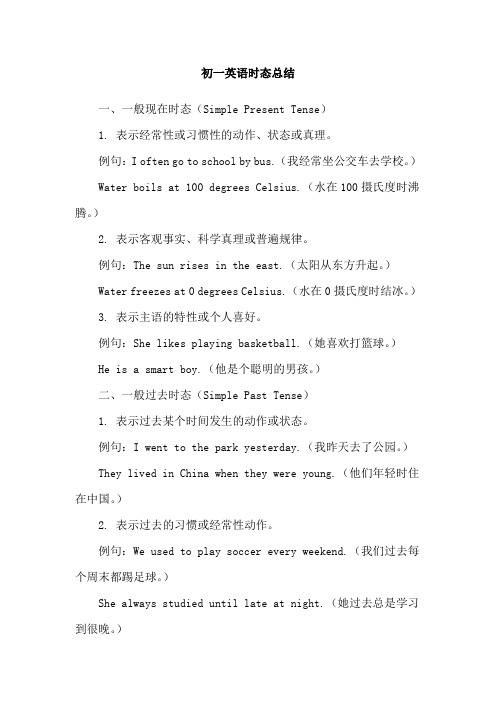
初一英语时态总结一、一般现在时态(Simple Present Tense)1. 表示经常性或习惯性的动作、状态或真理。
例句:I often go to school by bus.(我经常坐公交车去学校。
) Water boils at 100 degrees Celsius.(水在100摄氏度时沸腾。
)2. 表示客观事实、科学真理或普遍规律。
例句:The sun rises in the east.(太阳从东方升起。
)Water freezes at 0 degrees Celsius.(水在0摄氏度时结冰。
) 3. 表示主语的特性或个人喜好。
例句:She likes playing basketball.(她喜欢打篮球。
)He is a smart boy.(他是个聪明的男孩。
)二、一般过去时态(Simple Past Tense)1. 表示过去某个时间发生的动作或状态。
例句:I went to the park yesterday.(我昨天去了公园。
) They lived in China when they were young.(他们年轻时住在中国。
)2. 表示过去的习惯或经常性动作。
例句:We used to play soccer every weekend.(我们过去每个周末都踢足球。
)She always studied until late at night.(她过去总是学习到很晚。
)3. 表示过去的真理或规律。
例句:Dinosaurs existed millions of years ago.(恐龙存在于几百万年前。
)The Earth was flat according to ancient beliefs.(根据古代的信仰,地球是平的。
)三、一般将来时态(Simple Future Tense)1. 表示将来某个时间或在某个时间之后发生的动作或状态。
例句:I will visit my grandparents next week.(下周我会去看望我的祖父母。
初中英语四种时态归纳总结
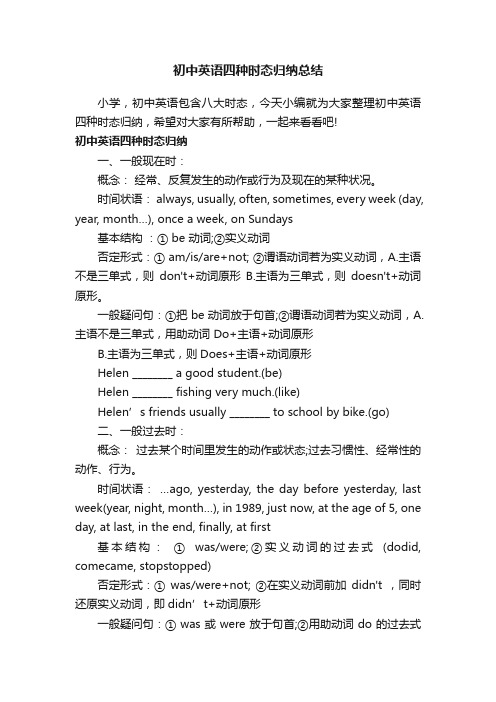
初中英语四种时态归纳总结小学,初中英语包含八大时态,今天小编就为大家整理初中英语四种时态归纳,希望对大家有所帮助,一起来看看吧!初中英语四种时态归纳一、一般现在时:概念:经常、反复发生的动作或行为及现在的某种状况。
时间状语: always, usually, often, sometimes, every week (day, year, month…), once a week, on Sundays基本结构:① be 动词;②实义动词否定形式:① am/is/are+not; ②谓语动词若为实义动词,A.主语不是三单式,则don't+动词原形B.主语为三单式,则doesn't+动词原形。
一般疑问句:①把 be 动词放于句首;②谓语动词若为实义动词,A.主语不是三单式,用助动词 Do+主语+动词原形B.主语为三单式,则Does+主语+动词原形Helen ________ a good student.(be)Helen ________ fishing very much.(like)Helen’s friends usually ________ to school by bike.(go)二、一般过去时:概念:过去某个时间里发生的动作或状态;过去习惯性、经常性的动作、行为。
时间状语:…ago, yesterday, the day before yesterday, last week(year, night, month…), in 1989, just now, at the age of 5, one day, at last, in the end, finally, at first基本结构:①was/were;②实义动词的过去式(dodid, comecame, stopstopped)否定形式:①was/were+not; ②在实义动词前加didn't ,同时还原实义动词,即didn’t+动词原形一般疑问句:① was 或 were 放于句首;②用助动词 do 的过去式did 提问,同时还原实义动词。
四种英语时态
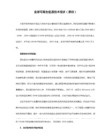
Ⅱ过去时态:四种
5.一般过去时态:表示过去存在的状态(be动词),经常做的动作
I did it. 我(过去经常)做这件事。
6.过去进行时态:表示过去正在进行的动作
I was doing it. 我(过去的某个时间)正在做这件事。
7.过去完成时态:表示过去已经完成,对过去的某个时间产生影响,形成结果
16.过去将来完成进行时态:表示对过去的某一时间来讲的将来一直在进行的动作(字面意思已经在进行),对现在来讲已成过去
I would have been doing it.
英语的基本时态由四种“时”(时间),四种“态”(状态)交叉构成。
四种“时”:过去 现在 将来 过去将来
四种“态”:常态 进行态 完成态 完成进行态
Ⅰ现在时态:四种
1.一般现在时态:表示现存的状态(be动词),经常做的动作
I do it. 我(经常)做这件事。
2.现在进行时态:表示正在进行的动作
I will do it. 我将要做这件事。
10.将来进行时态:表示将来正在进行的动作
I will be doing it. 我将要正在做这件事。
11.将来完成时态:表示到将来的某个时间已经完成,对那个时间产生影响,形成结果
I will have done it. 我(到将来的某个时间)已经做完这件事了。
I would do it.
14.ቤተ መጻሕፍቲ ባይዱ去将来进行时态:表示对过去的某一时间来讲的将来正在进行的动作,对现在来讲已成过去
I would be doing it.
15.过去将来完成时态:表示对过去的某一时间来讲的到将来的某个时间已经完成,对那个时间产生影响,形成结果,对现在来讲已成过去
初一英语四大时态

初一英语四大时态一、一般现在时1.概念: 经常、反复发生的动作及现在的某种状况。
2.时间状语——标志词:always,usually,often,sometimes,every week,on Sundays,etc3.肯定句:主语+be(am,is,are); 主语(其余人称)+动词原形; 主语(三单)+动三单(V-s/es),4.否定形式:主语+am(is/are)+not ; 主语+don’t+动原; 主语(三单)+does’t+动原5.一般疑问句: Am/ Is /Are+主语………….? Do/Does+主语+动原………..?专项练习用括号内动词的适当形式填空。
1.He often (have) dinner at home.2.David and Tom (be) in Class One.3.We (not watch) TV on Mondays.4.Mike (like) cooking.4.You always (do) your homework well. 8.Liu Tao (not like) PE.9.The child often (watch) TV in the morning. 10.Everyone in our class (like) PE a lot.按要求改写句子1.David watches TV in the evening.否定句:David TV in the evening.一般疑问句:David TV in the evening? Yes,he对划线部分提问:David TV?2.I do my homework every day.否定句:I do my homework every day.一般疑问句:you your homework every day? No,I .对划线部分提问:you every day?3.She is a worker.否定句:She a worker.一般疑问句:She a worker?对划线部分提问:She?= She ?二、一般过去时1.概念: 过去某个时间里发生的动作或状态;过去习惯性、经常性的动作、行为。
初一英语时态总结

初一英语时态总结英语时态对于初学者来说是一个比较难以掌握的知识点。
在初中阶段,学生们开始接触各种不同的时态,如简单现在时、一般过去时、一般将来时等。
本文将对初一英语时态进行总结和介绍,帮助初学者更好地理解和运用时态知识。
1. 简单现在时 (Simple Present Tense)简单现在时用来表示经常性、习惯性或普遍性的动作。
一般情况下,我们只需要在动词原形后加上第三人称单数的“s”即可。
例如:He plays soccer on weekends.(他周末踢足球。
)此外,也可以使用一些表示频率的词汇,如always,often,sometimes等。
2. 一般过去时 (Simple Past Tense)一般过去时用来表示发生在过去某个时间的动作或状态。
对于大多数动词而言,其过去式形态是在动词原形后加上-ed。
例如:I watcheda movie last night.(昨晚我看了一部电影。
)然而,也有一些特殊的动词需要记忆其不规则的过去式形态,如go-went、eat-ate等。
3. 一般将来时 (Simple Future Tense)一般将来时用来表示将来某时将要发生的动作或状态。
一般情况下,我们使用will加动词原形来构成简单将来时。
例如:They will go to the park tomorrow.(他们明天将去公园。
)此外,我们也可以使用begoing to来表示预计将要进行的动作。
例如:She is going to visit her grandmother next week.(她下周将要去看她的奶奶。
)4. 现在进行时 (Present Continuous Tense)现在进行时用来表示正在进行的动作。
构成现在进行时的方式为be动词(am/is/are)加动词的现在分词形式(-ing形式)。
例如:He is eating dinner at the moment.(他此刻正在吃晚餐。
七年级英语时态总结

七年级英语时态总结一、一般现在时。
1. 概念。
- 表示经常或习惯性的动作或存在的状态。
例如:I often go to school by bike.(我经常骑自行车去上学。
)He is a student.(他是一名学生。
)2. 构成。
- be动词:主语为第一人称单数(I)时用am;主语为第三人称单数(he/she/it 等)时用is;主语为复数(we/you/they等)或第二人称单数(you)时用are。
例如:I am a girl. He is my brother. They are my friends.- 实义动词:- 当主语为第三人称单数时,动词要加 -s或 -es。
例如:He likes reading books.(like变成likes)- 当主语为其他人称时,动词用原形。
例如:We play football on Sundays.3. 时间状语。
- 常与often(经常), usually(通常), sometimes(有时), always(总是), every day/week/month/year(每天/周/月/年)等连用。
例如:She usually gets up at six o'clock.二、现在进行时。
1. 概念。
- 表示现在正在进行的动作或存在的状态。
例如:Look! They are playing basketball.(看!他们正在打篮球。
)2. 构成。
- be动词(am/is/are)+动词的 -ing形式。
例如:I am reading a book. Heis watching TV. They are having lunch.3. 动词 -ing形式的构成规则。
- 一般在动词原形末尾加 -ing。
如:go - going, play - playing。
- 以不发音的字母e结尾的动词,先去掉e,再加 -ing。
如:write - writing, have - having。
英语的四大时态用法及结构
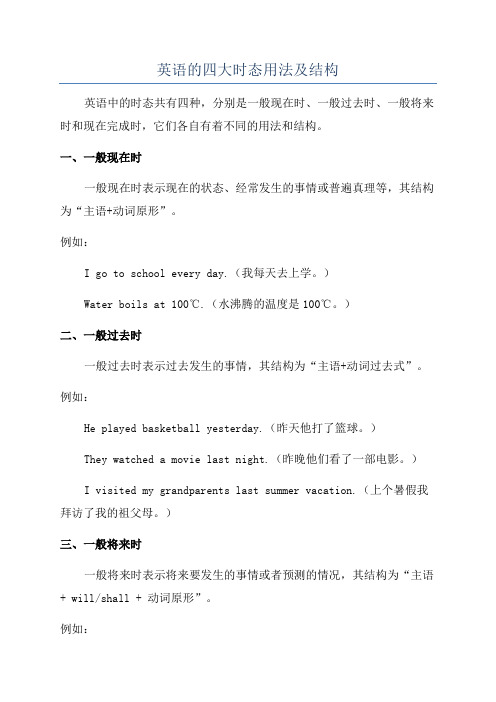
英语的四大时态用法及结构英语中的时态共有四种,分别是一般现在时、一般过去时、一般将来时和现在完成时,它们各自有着不同的用法和结构。
一、一般现在时一般现在时表示现在的状态、经常发生的事情或普遍真理等,其结构为“主语+动词原形”。
例如:I go to school every day.(我每天去上学。
)Water boils at 100℃.(水沸腾的温度是100℃。
)二、一般过去时一般过去时表示过去发生的事情,其结构为“主语+动词过去式”。
例如:He played basketball yesterday.(昨天他打了篮球。
)They watched a movie last night.(昨晚他们看了一部电影。
)I visited my grandparents last summer vacation.(上个暑假我拜访了我的祖父母。
)三、一般将来时一般将来时表示将来要发生的事情或者预测的情况,其结构为“主语+ will/shall + 动词原形”。
例如:I will go to the library tomorrow.(我明天去图书馆。
)She shall visit her friends ne某t week.(下周她要去拜访她的朋友。
)The sky will be cloudy this afternoon.(今天下午天空将会是多云的。
)四、现在完成时现在完成时表示过去某个时间开始的某个动作一直持续到现在,或者过去某个时间开始的某个动作已经结束但对现在还有影响,其结构为“主语 + have/has + 动词过去分词”。
例如:I have been studying English for four years.(我已经学英语四年了。
)They have finished their homework.(他们已经完成了本次作业。
)She has lost her key.(她已经把钥匙丢失了。
人教版七年级英语时态总结
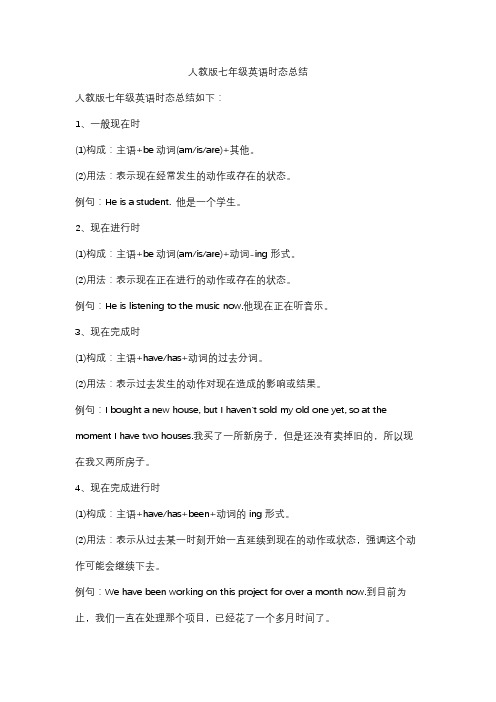
人教版七年级英语时态总结人教版七年级英语时态总结如下:1、一般现在时(1)构成:主语+be动词(am/is/are)+其他。
(2)用法:表示现在经常发生的动作或存在的状态。
例句:He is a student. 他是一个学生。
2、现在进行时(1)构成:主语+be动词(am/is/are)+动词-ing形式。
(2)用法:表示现在正在进行的动作或存在的状态。
例句:He is listening to the music now.他现在正在听音乐。
3、现在完成时(1)构成:主语+have/has+动词的过去分词。
(2)用法:表示过去发生的动作对现在造成的影响或结果。
例句:I bought a new house, but I haven't sold my old one yet, so at the moment I have two houses.我买了一所新房子,但是还没有卖掉旧的,所以现在我又两所房子。
4、现在完成进行时(1)构成:主语+have/has+been+动词的ing形式。
(2)用法:表示从过去某一时刻开始一直延续到现在的动作或状态,强调这个动作可能会继续下去。
例句:We have been working on this project for over a month now.到目前为止,我们一直在处理那个项目,已经花了一个多月时间了。
5、一般过去时(1)构成:主语+动词的过去式。
(2)用法:表示过去某个时间发生的动作或存在的状态。
例句:I bought some fruits yesterday.我昨天买了一些水果。
6、过去进行时(1)构成:主语+was/were+动词-ing形式。
(2)用法:表示过去某个时间正在进行的动作或存在的状态。
例句:I was travelling in London last summer vacation.去年暑假我在伦敦旅行。
7、过去完成时(1)构成:主语+had+动词的过去分词。
四种基本时态的详细解析
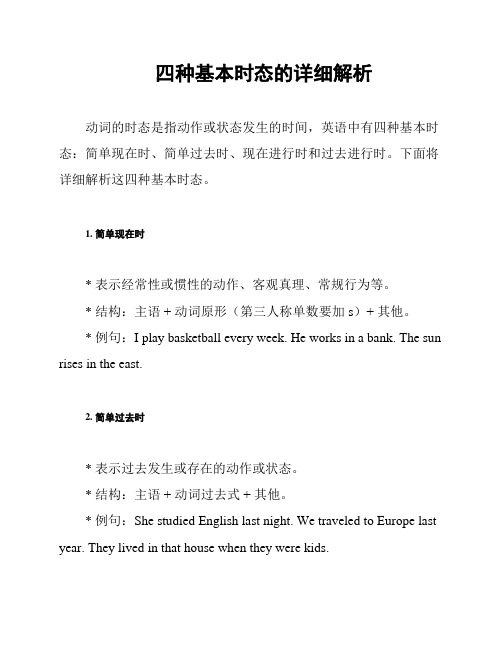
四种基本时态的详细解析动词的时态是指动作或状态发生的时间,英语中有四种基本时态:简单现在时、简单过去时、现在进行时和过去进行时。
下面将详细解析这四种基本时态。
1. 简单现在时* 表示经常性或惯性的动作、客观真理、常规行为等。
* 结构:主语 + 动词原形(第三人称单数要加s)+ 其他。
* 例句:I play basketball every week. He works in a bank. The sun rises in the east.2. 简单过去时* 表示过去发生或存在的动作或状态。
* 结构:主语 + 动词过去式 + 其他。
* 例句:She studied English last night. We traveled to Europe last year. They lived in that house when they were kids.3. 现在进行时* 表示现在正在进行的动作。
* 结构:主语+ be动词(am/is/are)+ 动词的现在分词+ 其他。
* 例句:They are playing soccer at the moment. He is watchingTV right now. I am studying for the exam.4. 过去进行时* 表示过去某一时刻正在进行的动作。
* 结构:主语 + was/were + 动词的现在分词 + 其他。
* 例句:She was cooking dinner when the phone rang. They were driving to work at that time. I was sleeping when he came home.以上就是四种基本时态的详细解析。
在运用时,请根据具体语境选择适当的时态,以准确表达所要表达的动作或状态。
初一上四大时态知识点归纳总结

初一上四大时态知识点归纳总结一、什么是时态?时态是指动词所表示的动作或状态在时间上的不同变化。
英语中常用的四大时态包括现在时态、过去时态、将来时态和完成时态。
二、现在时态1. 一般现在时(Simple Present)- 表示经常性或习惯性的动作或状态:I play basketball every weekend.- 表示现阶段的状况或真理:The sun rises in the east.2. 现在进行时(Present Continuous)- 表示目前正在进行的动作:She is studying in her room.- 表示现阶段暂时的情况:I'm staying at my friend's house while my house is being renovated.三、过去时态1. 一般过去时(Simple Past)- 表示过去某个时间发生的动作或状态:He finished his homework yesterday.- 表示过去的经常性或习惯性动作:I often went fishing with my dad when I was young.2. 过去进行时(Past Continuous)- 表示过去某个时间正在进行的动作:They were playing soccer when it started to rain.- 表示过去某个时间暂时的情况:She was living in Paris for six months.四、将来时态1. 将来时(Simple Future)- 表示将来某个时间要发生的动作:They will arrive at 8 pm tomorrow.- 表示将来的计划、安排或意愿:I will help you with your project.2. 将来进行时(Future Continuous)- 表示将来某个时间正在进行的动作:This time tomorrow, I will be flying to New York.- 表示将来某个时间暂时的情况:She will be staying at a hotel until her new house is ready.五、完成时态1. 现在完成时(Present Perfect)- 表示过去发生并与现在有关的动作:I have finished my homework.- 表示经历过的经验或已完成的动作:He has visited Paris twice.2. 过去完成时(Past Perfect)- 表示过去某个时间之前已经发生的动作:She had already eaten when I arrived.- 表示过去的经历或经验:By the time they reached the theater, the show had already started.3. 将来完成时(Future Perfect)- 表示将来某个时间之前将会完成的动作:By this time next year, I will have graduated from university.- 表示对将来的预测或推测:They will have finished the project by tomorrow.总结:初一上学期所学的四大时态包括现在时态、过去时态、将来时态和完成时态。
初一四种基本英语时态

1.一般现在时:1)一般现在时表示经常发生或习惯性的动作或状态及客观现实和普遍真理。
一般现在时常以动词原形表示,但当主语是第三人称单数时,动词词尾加-s或-es。
2)句型结构:主语+V.(包括be动词)+宾语+…She is an engineer.He has breakfast at 6:00every day.3)注意:a)一般现在时通常与always , often , usually , every day , sometimes , once a week 等时间状语连用。
I always watch TV at 8:00 in the evening. They go home once a week.We usually do our homework at home.b)表客观现实或普遍真理。
The sun always rises in the east. The light travels faster than the sound.c)表永远性的动作或状态。
He lives in the country.4)第三人称单数变化形式。
a)一般情况动词在词尾加-s .come---comes speak---speaks work---works live---livesb)以o, s, x, ch, sh结尾的单词在词后加-es.do---does go---goes finish---finishes brush---brushes fix---fixes pass---passes watch---watchesc)以“辅音字母+y”结尾的单词变y为i加-es.Study---studies carry-carries cry---criesd)以“元音字母+y”结尾的单词直接加-s.Play---plays stay---stays5)否定句和疑问句。
Eg:a)-----He is an engineer.-----He isn’t an engineer.-----Is he an engineer?-----Yes, he is. / No, he isn’t.b) ----We get up at 7:30 in the morning.-----We don’t get up at 7:30 in the morning .-----Do you get up at 7:30 in the morning?-----Yes, we do. / No, we don’t.c) ----He likes music.-----He doesn’t like music.-----Does he like music?-----Yes ,he does./ No, he doesn’t练习:我们每天晚上九点做作业。
初一四种时态
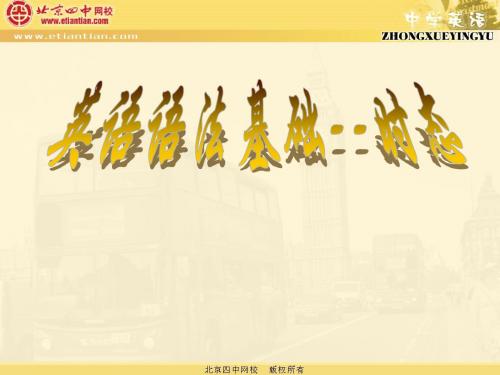
• 1. The old man gets up at six o’clock in the morning every day. • 2. We are going to do/will do some sightseeing tomorrow because we like Chinese culture. • 3. Tony will take/ is going to take a test next week. • 4. They will have/ are going to have a party with their friends the day after tomorrow. • 5. They are staying in a hotel in San Francisco at the moment, but they are moving to another hotel very soon.
(二). 现在进行时
• [语法讲解] • 1. 现在进行时的基本用法: • 1) 表示说话时正在进行的动作: 常和now look、listen、at the moment等。 • What is your father doing now? Look!A dog is running after a cat. Listen!He is playing the piano.
(三). 一般将来时
• 1.一般将来时的基本概念: 一般将来时表示将来某一时刻的动作或 状态,或将来某一段时间内经常的动作 或状态。一般将来时由助动词shall(第 一人称),will/be going to(各种人 称)+动词原形构成。
• 2.时间状语连用,如: tomorrow, next week, from now on, in the future等。
- 1、下载文档前请自行甄别文档内容的完整性,平台不提供额外的编辑、内容补充、找答案等附加服务。
- 2、"仅部分预览"的文档,不可在线预览部分如存在完整性等问题,可反馈申请退款(可完整预览的文档不适用该条件!)。
- 3、如文档侵犯您的权益,请联系客服反馈,我们会尽快为您处理(人工客服工作时间:9:00-18:30)。
初一英语四种基本时态复习一、一般现在时一般现在时的用法1)经常性或习惯性的动作,常与表示频腮度的时间状语连用。
时间状语:every…, sometimes, at…, on Sunda y。
例如:I leave home for school at 7 every morning. 每天早上我七点离开家。
2)客观真理,客观存在,科学事实。
例如:The earth moves around the sun. 地球绕太阳转动。
Shanghai lies in the east of China. 上海位于中国东部。
3)表示格言或警句。
例如:Pride goes before a fall. 骄者必败。
注意:此用法如果出现在宾语从句中,即使主句是过去时,从句谓语也要用一般现在时。
例:Columbus proved that the earth is round. 哥伦布证实了地球是圆的。
4)现在时刻的状态、能力、性格、个性。
例如:I don't want so much. 我不要那么多。
Ann writes good English but does not speak well. 安英语写得不错,讲的可不行。
课堂小测1. We often______(play) in the playgound.2. He _____(get) up at six o’clock.3. _____you ______(brush) your teeth every morning.4. What (do) ______he usually (do)______ after school5. Danny _____(study) English,Chinese,Maths,Science and Art an school.6. Mike sometimes ________(go) to the park with his sister.7. At eight at night, she __________(watch) TV with his parents.8. ________ Mike________(read) English every day9. How many lessons_________your classmate________(have) on Monday10. What time_________his mother_________(do) the housework改句子1. Do you often play football after school (肯定回答)2. Gao Shan’s sister likes playing table tennis (改为否定句)3. She lives in a small town near New York. (改为一般疑问句)4. We have four lessons.(否定句)5. Nancy doesn’t run fast (肯定句)6. Mike has two letters for him.一般疑问句:否定句:7. I usually play football on Friday afternoon.否定句:一般疑问句:划线提问8. Tom does his homework at home.否定句:一般疑问句:划线提问二、一般过去时一般过去时的基本用法:1.通常表示过去发生的而现在已经结束的事件、动作或情况。
Eg. Sam phoned a moment ago.2. 还可以表示刚刚发生的事情而没说明时间。
Eg. Did the telephone ring3. 也可以表示过去的习惯性动作。
Eg. I smoked 40 cigarettes a day till I gave up.(二)与一般过去时连用的时间状语:yesterday, last week/Sunday/year, …ago, just now…eg. I met Lily yesterday.He had dinner just now.(三)一般过去时的构成:1. 有be的句子。
am/is—was are—wereeg.肯定句:He was a cook 2 years ago.They were at school yesterday.否定句:He was not a cook 2 years ago.They were not at school yesterday.一般疑问句:Was he a cook 2 years agoYes, he was. No, he wasn’t.Were they at school yesterdayYes, they were. No, they weren’t课堂小测一、单项选择:从下列各题后所给的四个选项中选择最佳答案填空。
(10)( ) 1. My father______ill yesterday.A. isn't B. aren't C. wasn't D. weren't( ) 2.______your parents at home last week﹖A. Is B. Was C. Are D. Were( ) 3. The twins______in Dalian last year. They______here now.A. are; were B. were; are C. was; are D. were ;was( ) 4.______your father at work the day___yesterday(前天)﹖A. Was; before B. Is; before C. Was; after D. Is;after( ) 5.—Who was on duty last Friday﹖—______.A. I am B. I was C. Yes, I was D. No, I wasn't( ) 6. I cleaned my classroom ___________.A with three hoursB three hours agoC in three hoursD three hours before( ) 7. I came _______ my house two days ago .A back onB back toC to backD back( ) 8 . ___________ He did some reading at home.A What does your father do yesterday eveningB What does your brother do in the schoolC What did your brother do over the weekendD Where did your brother go last Sunday( ) 9. What did you do ________ I went to the movies.A next morningB over the weekendC in the weekendD nextMonday( ) 10. The koala sleeps _______,but gets up _________.A during the day; at the eveningB at day ; duringnightC in the day ; during the eveningD during theday ; at night二、请用正确动词形式填空。
(10)1. I _________ (have) an exciting party last weekend.2. _________ she _______(practice) her guitar yesterday No, she_________.3. What ________ Tom ________ (do) on Saturday eveningHe ________ (watch) TV and __________(read) an interesting book.4. They all _________ (go) to the mountains yesterday morning.5. She _________ (not visit) her aunt last weekend.She ________ (stay) at home and _________(do) some cleaning.6. When _______ you ________ (write) this song I ________(write) itlast year.7. My friend, Carol, _______ (study) for the math test and_______(practice) English last night.8. ________ Mr. Li __________(do) the project on Monday morning Yes,he _________.9. How _________(be) Jim's weekend It _________ (be not) bad.10. ________ (be) your mother a sales assistant last year No. she__________.三、改错题(20)1.How is Jane yesterday _____________________2.He go to school by bus last week. ____________________________ 3.He often goes home at 6:00 last month. ____________________________ 4.I can fly kites seven years ago. ______________________________ 5.Did you saw him just now. ____________________________________ 6.Tom wasn’t watch TV last night. ____________________________________ 7.I didn’t my homework yesterday. ____________________________________ 8.He wait for you three hours ago. ____________________________________ 9.Who find it just now ________________________________________make him cry (哭) just now __________________________________一般将来时1)一般将来时的构成:1. 助动词will(shall)+动词原形2. am / is / are +going to +动词原形2)一般将来时的用法:1.将要发生的动作。
